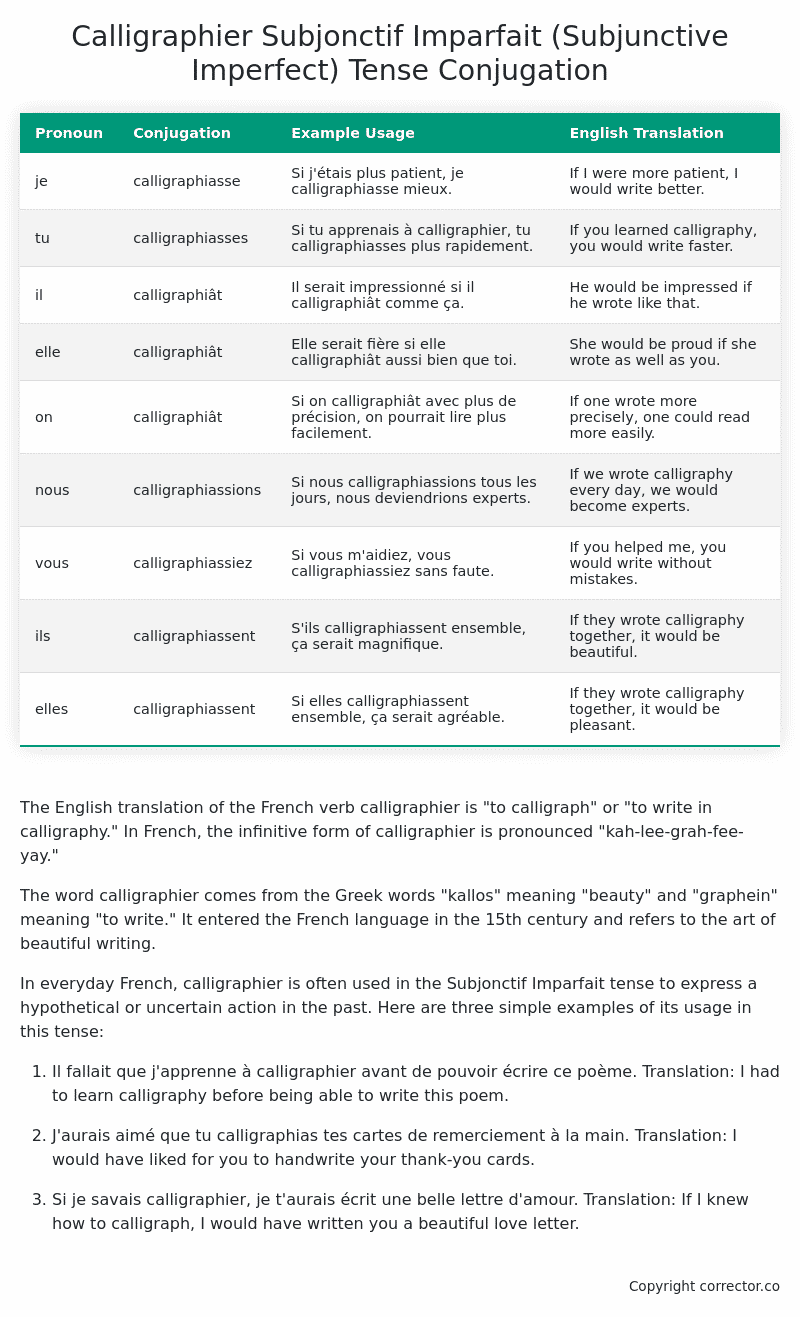Subjonctif Imparfait (Subjunctive Imperfect) Tense Conjugation of the French Verb calligraphier
Introduction to the verb calligraphier
The English translation of the French verb calligraphier is “to calligraph” or “to write in calligraphy.” In French, the infinitive form of calligraphier is pronounced “kah-lee-grah-fee-yay.”
The word calligraphier comes from the Greek words “kallos” meaning “beauty” and “graphein” meaning “to write.” It entered the French language in the 15th century and refers to the art of beautiful writing.
In everyday French, calligraphier is often used in the Subjonctif Imparfait tense to express a hypothetical or uncertain action in the past. Here are three simple examples of its usage in this tense:
-
Il fallait que j’apprenne à calligraphier avant de pouvoir écrire ce poème.
Translation: I had to learn calligraphy before being able to write this poem. -
J’aurais aimé que tu calligraphias tes cartes de remerciement à la main.
Translation: I would have liked for you to handwrite your thank-you cards. -
Si je savais calligraphier, je t’aurais écrit une belle lettre d’amour.
Translation: If I knew how to calligraph, I would have written you a beautiful love letter.
Table of the Subjonctif Imparfait (Subjunctive Imperfect) Tense Conjugation of calligraphier
| Pronoun | Conjugation | Example Usage | English Translation |
|---|---|---|---|
| je | calligraphiasse | Si j’étais plus patient, je calligraphiasse mieux. | If I were more patient, I would write better. |
| tu | calligraphiasses | Si tu apprenais à calligraphier, tu calligraphiasses plus rapidement. | If you learned calligraphy, you would write faster. |
| il | calligraphiât | Il serait impressionné si il calligraphiât comme ça. | He would be impressed if he wrote like that. |
| elle | calligraphiât | Elle serait fière si elle calligraphiât aussi bien que toi. | She would be proud if she wrote as well as you. |
| on | calligraphiât | Si on calligraphiât avec plus de précision, on pourrait lire plus facilement. | If one wrote more precisely, one could read more easily. |
| nous | calligraphiassions | Si nous calligraphiassions tous les jours, nous deviendrions experts. | If we wrote calligraphy every day, we would become experts. |
| vous | calligraphiassiez | Si vous m’aidiez, vous calligraphiassiez sans faute. | If you helped me, you would write without mistakes. |
| ils | calligraphiassent | S’ils calligraphiassent ensemble, ça serait magnifique. | If they wrote calligraphy together, it would be beautiful. |
| elles | calligraphiassent | Si elles calligraphiassent ensemble, ça serait agréable. | If they wrote calligraphy together, it would be pleasant. |
Other Conjugations for Calligraphier.
Le Present (Present Tense) Conjugation of the French Verb calligraphier
Imparfait (Imperfect) Tense Conjugation of the French Verb calligraphier
Passé Simple (Simple Past) Tense Conjugation of the French Verb calligraphier
Passé Composé (Present Perfect) Tense Conjugation of the French Verb calligraphier
Futur Simple (Simple Future) Tense Conjugation of the French Verb calligraphier
Futur Proche (Near Future) Tense Conjugation of the French Verb calligraphier
Plus-que-parfait (Pluperfect) Tense Conjugation of the French Verb calligraphier
Passé Antérieur (Past Anterior) Tense Conjugation of the French Verb calligraphier
Futur Antérieur (Future Anterior) Tense Conjugation of the French Verb calligraphier
Subjonctif Présent (Subjunctive Present) Tense Conjugation of the French Verb calligraphier
Subjonctif Passé (Subjunctive Past) Tense Conjugation of the French Verb calligraphier
Subjonctif Imparfait (Subjunctive Imperfect) Tense Conjugation of the French Verb calligraphier (this article)
Conditionnel Présent (Conditional Present) Tense Conjugation of the French Verb calligraphier
Conditionnel Passé (Conditional Past) Tense Conjugation of the French Verb calligraphier
L’impératif Présent (Imperative Present) Tense Conjugation of the French Verb calligraphier
L’infinitif Présent (Infinitive Present) Tense Conjugation of the French Verb calligraphier
Struggling with French verbs or the language in general? Why not use our free French Grammar Checker – no registration required!
Get a FREE Download Study Sheet of this Conjugation 🔥
Simply right click the image below, click “save image” and get your free reference for the calligraphier Subjonctif Imparfait tense conjugation!

Calligraphier – About the French Subjonctif Imparfait (Subjunctive Imperfect) Tense
Formation
Common Everyday Usage Patterns
Interactions with Other Tenses
Subjonctif Présent
Indicatif Passé Composé
Conditional
Conditional Perfect
Summary
I hope you enjoyed this article on the verb calligraphier. Still in a learning mood? Check out another TOTALLY random French verb conjugation!


